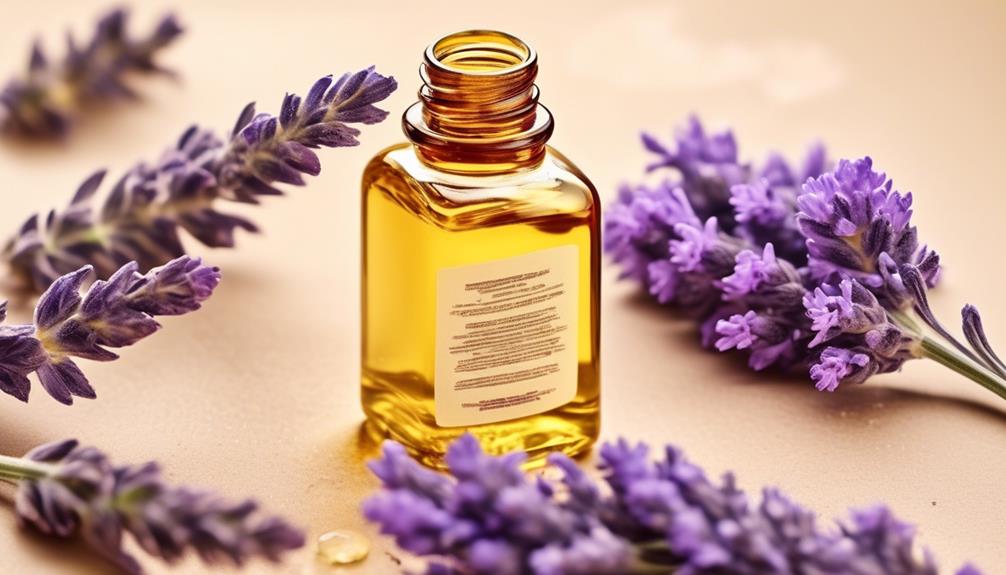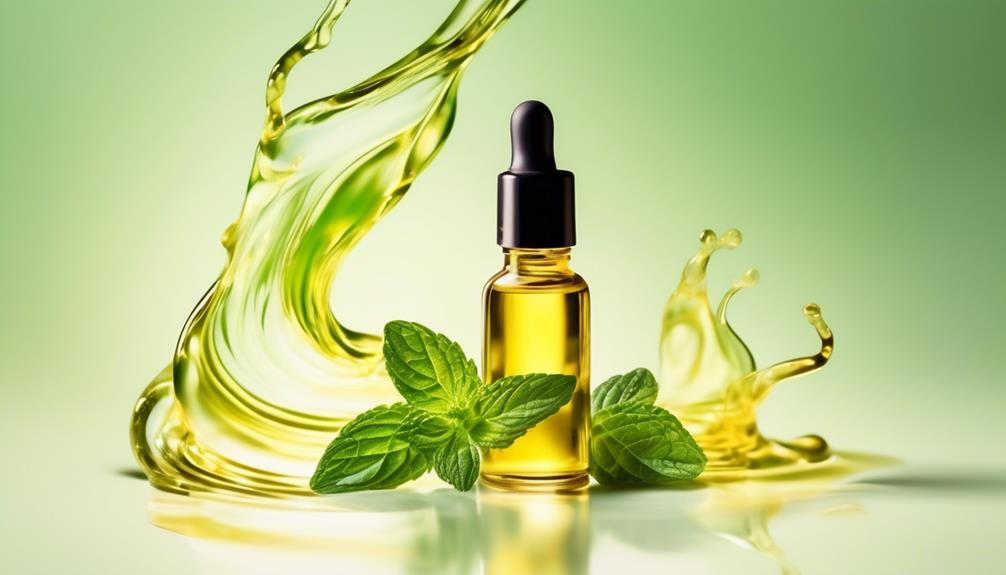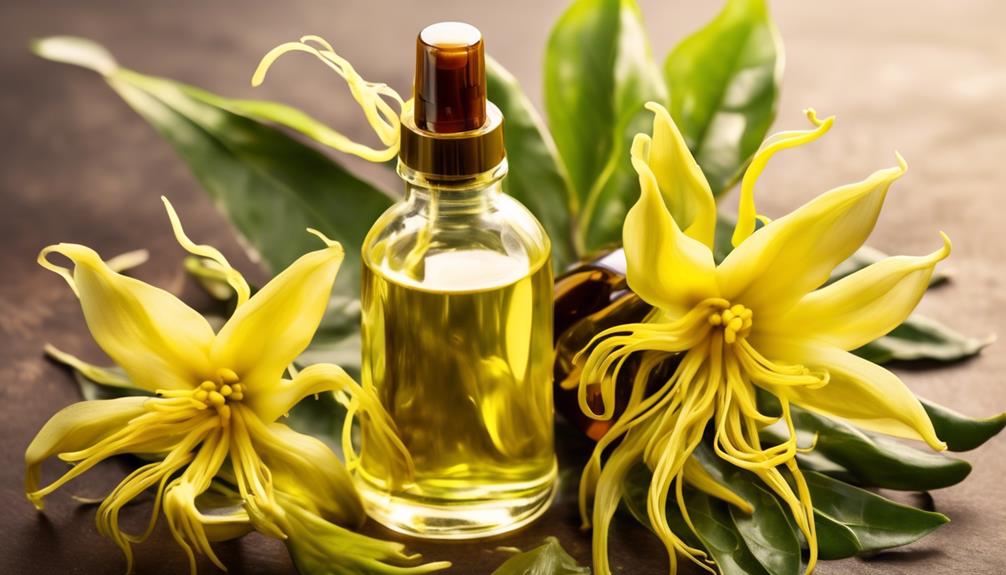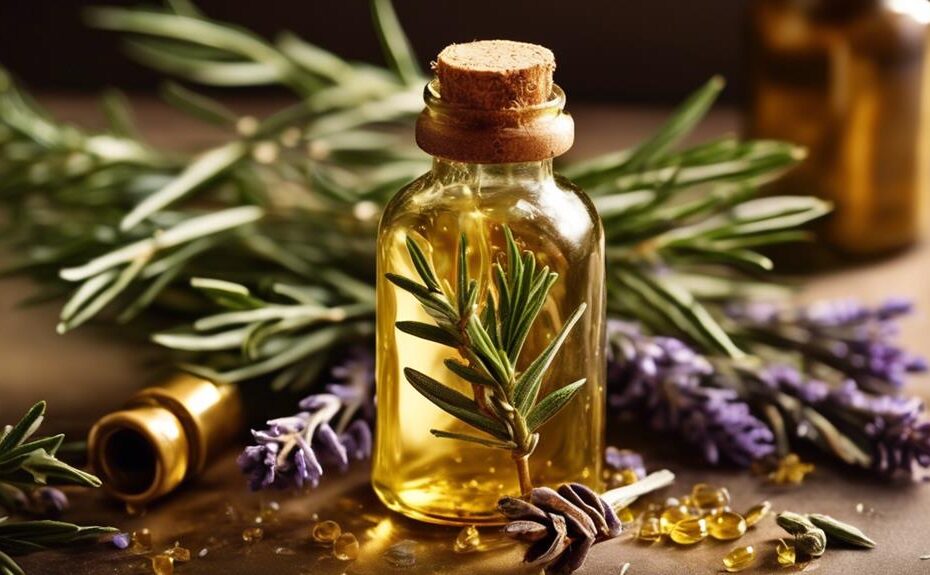When it comes to caring for our hair, we often seek natural remedies that can nourish and strengthen our locks. Castor oil has long been hailed for its numerous benefits in promoting hair growth and improving overall hair health. However, mixing it with the right essential oil can enhance its effectiveness and address specific hair concerns.
But which essential oil should you choose? The answer lies within the realm of nature’s aromatic treasures, each carrying its own unique properties that can complement the benefits of castor oil.
In this discussion, we will explore a selection of essential oils that pair harmoniously with castor oil, allowing you to unlock the full potential of your hair care routine.
So, let’s embark on this fragrant journey together and discover the perfect essential oil to elevate your hair care regime.
Key Takeaways
- Lavender oil, rosemary oil, and peppermint oil can improve blood circulation in the scalp, nourish hair follicles, and prevent scalp infections.
- Tea tree oil is effective in treating scalp conditions, promoting hair growth, and removing excess oil and dirt.
- Cedarwood oil stimulates hair follicles, reduces hair loss, and combats scalp infections.
- Ylang ylang oil improves blood circulation, balances scalp oil production, adds shine and softness to the hair, and protects it from damage.
Lavender Oil

Lavender oil is a versatile and widely used essential oil known for its soothing and calming properties. It has been used for centuries as a natural remedy for various ailments, including hair care. When it comes to hair, lavender oil offers numerous benefits and can be used in different ways to promote hair growth.
One of the main benefits of lavender oil for hair is its ability to improve blood circulation in the scalp. This increased blood flow helps to nourish the hair follicles, promoting healthier hair growth. Additionally, lavender oil is known for its antimicrobial properties, which can help to prevent scalp infections and reduce dandruff.
There are several ways to use lavender oil for hair growth. One popular method is to add a few drops of lavender oil to your regular shampoo or conditioner. This allows the oil to be evenly distributed throughout the hair, providing nourishment and promoting growth. Another option is to create a homemade hair mask by mixing lavender oil with a carrier oil, such as coconut or olive oil. Apply the mixture to your scalp and hair, leave it on for a few hours or overnight, and then wash it out.
Rosemary Oil
Rosemary oil is a versatile essential oil that is commonly used for hair care due to its numerous benefits and ability to promote healthy hair growth. Derived from the leaves of the rosemary plant through steam distillation, this potent oil is packed with powerful antioxidants and nutrients that can nourish and strengthen the hair follicles.
One of the key benefits of rosemary oil is its ability to stimulate hair growth. Its stimulating properties promote blood circulation to the scalp, which in turn encourages the growth of new hair. Additionally, rosemary oil has been found to inhibit the production of DHT, a hormone that is responsible for hair loss.
Rosemary oil also has antifungal and antibacterial properties, making it effective in treating scalp conditions such as dandruff and itching. Its soothing properties can help alleviate irritation and inflammation, promoting a healthier scalp environment for hair growth.
To use rosemary oil for hair growth, you can mix a few drops of it with a carrier oil such as castor oil. Massage the mixture into your scalp and leave it on for a few hours or overnight before rinsing it out. Regular use of rosemary oil can help strengthen the hair shafts, prevent breakage, and improve overall hair health.
Peppermint Oil

Peppermint oil, derived from the peppermint plant through steam distillation, is a versatile essential oil with a range of benefits for hair care. Known for its refreshing and invigorating scent, peppermint oil also offers numerous advantages when it comes to promoting hair growth and maintaining a healthy scalp.
One of the key benefits of peppermint oil is its ability to stimulate blood circulation in the scalp. This increased blood flow can help nourish the hair follicles, promoting healthier hair growth. Additionally, peppermint oil has antimicrobial properties that can help combat scalp infections and reduce dandruff.
Peppermint oil also has a cooling effect on the scalp, which can help soothe irritation and inflammation. This can be particularly beneficial for individuals with dry or itchy scalps. Furthermore, the menthol content in peppermint oil provides a refreshing sensation and can enhance the overall health and vitality of the hair.
To incorporate peppermint oil into your hair care routine, you can mix it with castor oil. Castor oil is known for its moisturizing and strengthening properties, making it an excellent carrier oil for peppermint oil. Simply blend a few drops of peppermint oil with castor oil and apply the mixture to your scalp and hair. Massage it in gently and leave it on for a few hours or overnight before rinsing it out.
Tea Tree Oil
Tea tree oil is a popular essential oil known for its numerous benefits for hair health. It has antifungal and antibacterial properties that can help treat scalp conditions like dandruff and dryness.
When mixed with castor oil, tea tree oil can promote hair growth, strengthen the hair shaft, and improve overall scalp health.
However, it is important to use tea tree oil in moderation and perform a patch test before applying it directly to the scalp to avoid any potential side effects or allergic reactions.
Benefits of Tea Tree Oil
Tea tree oil, known for its numerous therapeutic properties, offers a wide range of benefits for hair health and well-being. This powerful essential oil is derived from the leaves of the Melaleuca alternifolia tree, native to Australia.
Here are three key benefits of tea tree oil for your hair:
- Promotes healthy scalp: Tea tree oil possesses antifungal and antibacterial properties that help combat scalp conditions like dandruff and dryness. Its soothing properties can reduce itchiness and irritation, promoting a healthier scalp environment.
- Stimulates hair growth: Tea tree oil can unclog hair follicles, allowing for better nutrient absorption and promoting hair growth. It also helps remove excess oil and dirt, preventing buildup that can hinder hair growth.
- Strengthens and nourishes hair: This essential oil can strengthen the hair shaft, reducing breakage and promoting overall hair health. Its moisturizing properties help nourish and hydrate the hair, leaving it soft and manageable.
To use tea tree oil for hair, you can add a few drops to your shampoo or conditioner, or dilute it with a carrier oil like coconut oil and massage it onto your scalp. Remember to do a patch test before applying it to your entire scalp, as some individuals may be sensitive to tea tree oil.
How to Use Tea Tree Oil
To effectively use tea tree oil for your hair, it is important to follow the proper techniques and guidelines.
Tea tree oil is known for its powerful antibacterial and antifungal properties, making it an excellent choice for treating acne and promoting scalp health.
When using tea tree oil for acne treatment, dilute it with a carrier oil like jojoba or coconut oil before applying it to the affected areas. Gently massage the mixture onto the skin and leave it on for a few hours or overnight.
For scalp health, add a few drops of tea tree oil to your shampoo or conditioner and massage it into your scalp. This will help to cleanse and clarify the scalp, promoting healthier hair growth.
Precautions and Side Effects
When using tea tree oil, it is important to be aware of potential precautions and side effects.
While tea tree oil is generally safe for most people, some individuals may experience allergic reactions. It is recommended to perform a patch test before using tea tree oil on your hair to check for any adverse reactions.
Additionally, tea tree oil should always be diluted with a carrier oil, such as castor oil, before applying it to the scalp or hair. This helps to prevent skin irritation and sensitivity.
Moreover, excessive use of tea tree oil may lead to hair loss. It is advisable to use tea tree oil in moderation and consult a healthcare professional if you experience any negative effects.
Cedarwood Oil
Cedarwood oil, known for its aromatic and therapeutic properties, is a popular choice for mixing with castor oil to promote healthy hair growth. Cedarwood oil is extracted from the bark of the cedar tree and has been used for centuries in traditional medicine for its numerous benefits. When it comes to hair care, cedarwood oil is particularly beneficial due to its ability to stimulate the hair follicles and promote blood circulation to the scalp.
One of the main benefits of cedarwood oil for hair growth is its ability to reduce hair loss. The oil helps to balance the oil-producing glands in the scalp, which can prevent excess oiliness or dryness that can lead to hair loss. Additionally, cedarwood oil has antifungal and antibacterial properties that can help combat scalp infections, dandruff, and other scalp conditions that may contribute to hair loss.
Another advantage of cedarwood oil is its ability to improve the overall health of the hair and scalp. It helps to strengthen the hair shaft, making it less prone to breakage and damage. Cedarwood oil also has a calming effect on the scalp, reducing inflammation and soothing any irritations or itchiness.
To use cedarwood oil for hair growth, simply mix a few drops with castor oil and massage the mixture into the scalp. Leave it on for at least an hour before washing it out. For best results, repeat this treatment regularly.
Ylang Ylang Oil

Ylang Ylang oil, renowned for its aromatic properties and therapeutic benefits, is a valuable addition when combined with castor oil for promoting healthy hair growth. Derived from the flowers of the Cananga odorata tree, this essential oil has been used for centuries in traditional medicine and beauty rituals.
Here are some key benefits of ylang ylang oil and how to use it for optimal results:
- Stimulates Hair Growth: Ylang ylang oil helps to improve blood circulation in the scalp, which promotes hair growth. Its nourishing properties also help to strengthen the hair follicles, reducing breakage and hair loss.
- Balances Scalp Oil Production: Ylang ylang oil has natural balancing properties that regulate sebum production on the scalp. This makes it particularly beneficial for those with oily or combination hair types, as it helps to control excess oil and prevent greasiness.
- Adds Shine and Softness: By moisturizing the hair shaft and reducing frizz, ylang ylang oil enhances the natural shine and softness of the hair. It also helps to repair and protect the hair from damage caused by environmental factors and styling tools.
To use ylang ylang oil with castor oil, simply mix a few drops of ylang ylang oil with a carrier oil such as castor oil. Massage the mixture onto the scalp and hair, focusing on the roots. Leave it on for at least 30 minutes or overnight for deep conditioning. Rinse thoroughly and shampoo as usual.
Incorporating ylang ylang oil into your hair care routine can help promote healthy, lustrous hair.
Lemon Oil
Lemon oil is a versatile essential oil that offers numerous benefits for hair health and can be effectively combined with castor oil to promote optimal hair growth and nourishment. Known for its refreshing citrus scent, lemon oil is derived from the peel of lemons through a process of cold pressing. It is rich in vitamins, antioxidants, and antibacterial properties, making it a powerful ingredient in hair care.
When it comes to skincare, lemon oil is highly beneficial. It possesses astringent properties that help to tighten the skin and reduce excess oil production. Lemon oil can also be used to lighten dark spots and blemishes, providing a brighter and more even complexion.
In addition to its benefits for hair and skin, lemon oil is also a popular choice for cleaning purposes. Its natural antimicrobial properties make it effective in killing bacteria, making it a great addition to homemade cleaning products. Lemon oil can be used to clean surfaces, remove stains, and freshen the air.
When combined with castor oil, lemon oil can enhance the nourishing and growth-promoting properties for the hair. It helps to stimulate the scalp and promote healthy hair follicles, resulting in stronger and thicker hair strands.
Frequently Asked Questions
What Are the Potential Side Effects of Using Lavender Oil on the Hair When Mixed With Castor Oil?
When mixing lavender oil with castor oil for hair, it is important to consider the potential side effects. Some individuals may experience skin irritations or allergic reactions, highlighting the need for caution when using this combination.
Can Rosemary Oil Mixed With Castor Oil Help With Hair Growth, or Is It Only Beneficial for Improving Scalp Health?
Rosemary oil mixed with castor oil has been shown to promote hair growth due to its stimulating properties. While it is primarily beneficial for improving scalp health, it also aids in strengthening hair follicles, resulting in thicker and healthier hair.
Is It Safe to Use Peppermint Oil Mixed With Castor Oil on Colored or Chemically Treated Hair?
Using peppermint oil mixed with castor oil on colored or chemically treated hair is generally safe. Castor oil provides nourishment and hydration, while peppermint oil can stimulate hair growth and improve scalp health. However, it is always recommended to do a patch test first.
Can Tea Tree Oil Mixed With Castor Oil Be Used to Treat Dandruff and Dry Scalp?
Tea tree oil mixed with castor oil can effectively treat dandruff and dry scalp due to its antifungal and antimicrobial properties. It helps to soothe the scalp, reduce flakiness, and promote a healthier scalp environment.
Are There Any Precautions or Considerations to Keep in Mind When Using Cedarwood Oil Mixed With Castor Oil for Hair Care?
When using cedarwood oil mixed with castor oil for hair care, it is important to consider the benefits of cedarwood oil, such as its ability to promote hair growth and reduce dandruff. However, precautions should be taken, such as performing a patch test and diluting the oils properly.
Conclusion
In conclusion, when it comes to mixing essential oils with castor oil for hair, options such as lavender, rosemary, peppermint, tea tree, cedarwood, ylang ylang, and lemon oil can provide various benefits. These oils can promote hair growth, improve scalp health, and add shine to the hair.
It is important to dilute essential oils properly and perform a patch test before applying them to the scalp.
One interesting statistic to evoke emotion is that approximately 50% of men and 25% of women experience hair loss by the age of 50, highlighting the need for natural remedies like essential oils.




